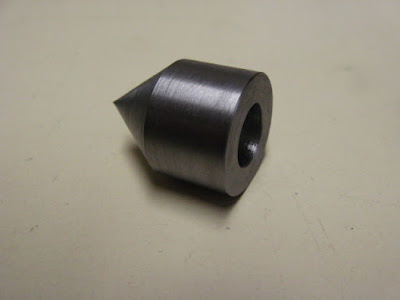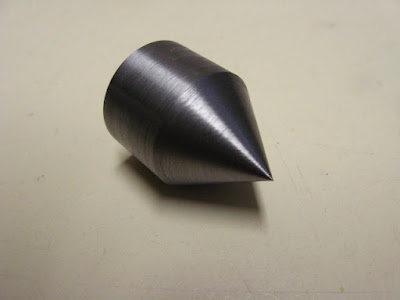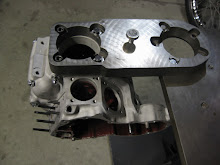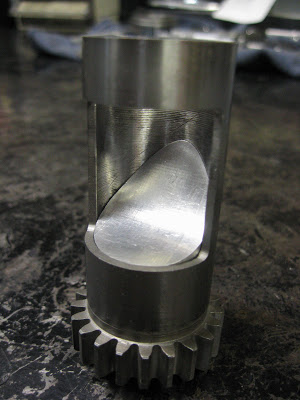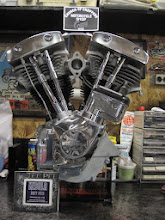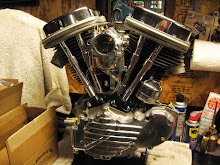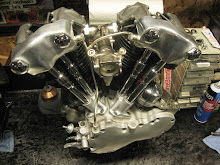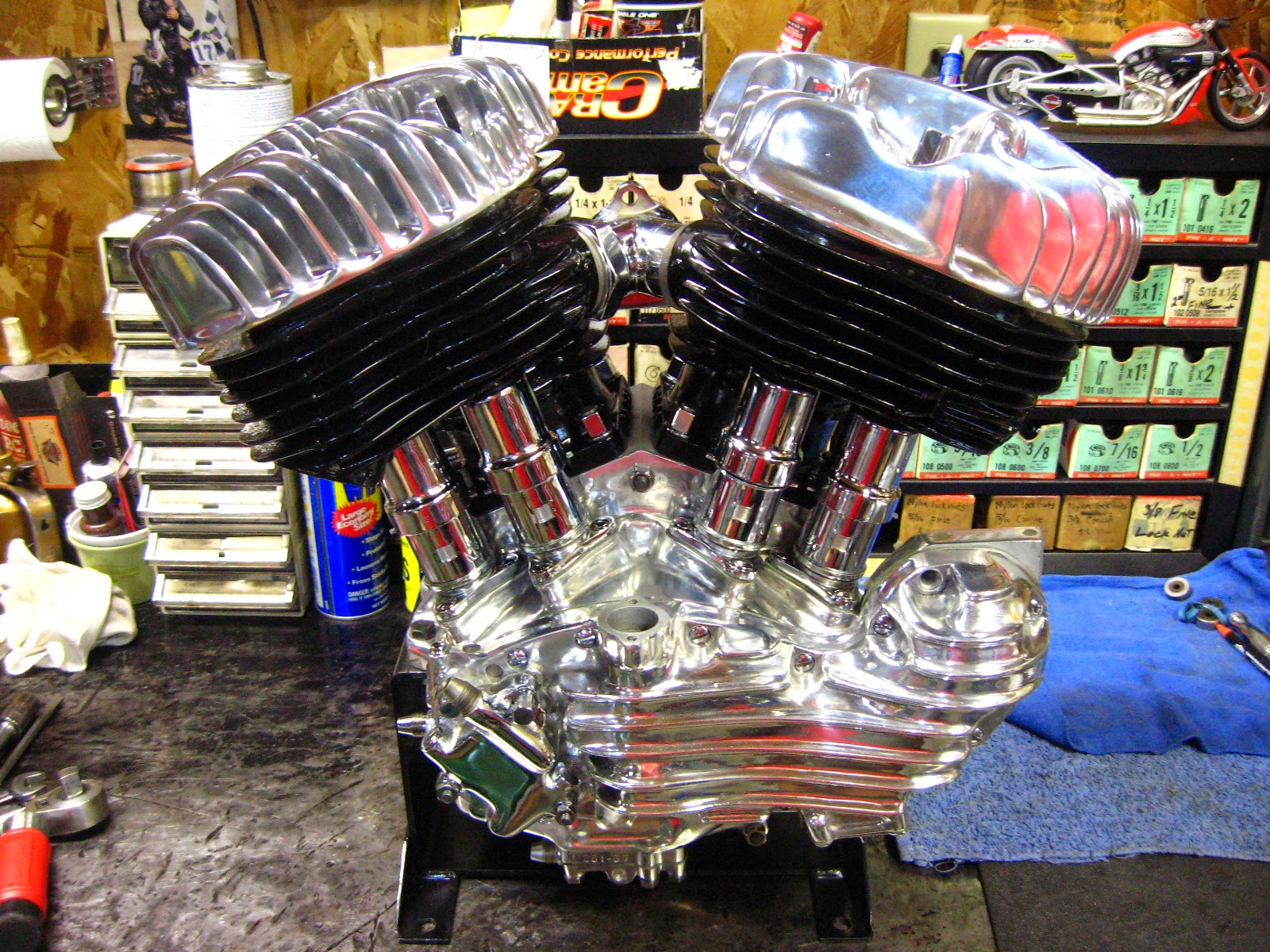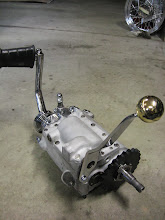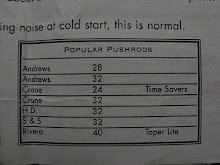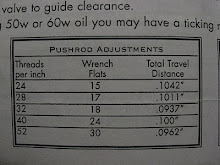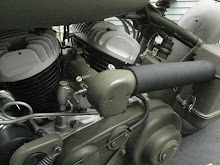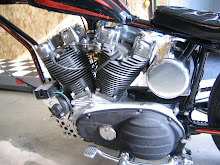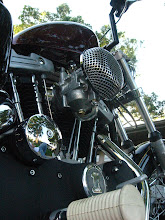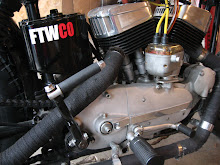Milwaukee
Milwaukee welcomes you ! I had a great time with Chris(cheeseburgers) and Hartman(diners and hot rods) and Drew(pizza & chicken) and Betsy(beer & chicken chunks) and it's great to see Klein, Fatty, Mike Lange, Bill R., Billy B., Nate, Mason, Jeremiah, Nick, Josh & Rakel, Jeremiah and Mona . . . and all the other new faces who gave me time and showed us some fun. A big thanks to Scott and Warren for all their hard work to put on the best bike show in the country and all the extras that go with it. Thanks fellas ! Hope to see ya'll again real soon. -Noot
BSA: Birmingham Small Arms
I don't normally post other than Harley-Davidson motorcycles . . . but, this BSA is one hell-of-a-bloody build.
by: Heroes Motors
I couldn't find a single "cheesy" thing on this build. Whoever built this motorcycle knows what they're doing . . . I'm sure it runs as good as it looks !
WR Chrome Moly Frame
Lighter than steel. Extra support bars on rear section. Extra holes in the neck casting. These frames broke kinda easy I've been told . . . not many left intact anymore.
Real Expensive.
I guess the "black colored" front hubs are probably aluminum too, just painted black? Harley-Davidson Racing had a rear drum kinda like this too? However, I think the rear drum on Leo Payne's Bonneville Race bike is this front drum, adapted for a rear drive sprocket? Correct me if I'm wrong. (Look how teeny tiny that sprocket is ! )
"What do you run for a front sprocket?" Answer: " A 21 Tooth"
"What do you run for a rear sprocket?" Answer: A 21 Tooth"
Huh?
They'll Pay . . . on Ebay
Veteran, experienced racers don't like to pay much for racing parts. They'll make due with a chipped gear, 'cause the parts will eventually get all blown to bits, wrecked, destroyed and thoroughly abused. Pistons with small scuffs get sanded and reused. Small cracks get JB Weld. Cams with welded up lobes, frames with extra gussets, funky brackets, duct tape, wire, welded nuts. Real racing motorcycles have all-of-the-above. Buckets and boxes of wrecked, unusable parts serve as filing cabinets, only to be gone through and inspected, fixed, rigged, and reused again. In a pinch. Anything to get back on the track. To compete no matter what it takes to get points. New, original builds always look so perfect, but after extended track time, the end of the season - all the racing motorcycles start to look the same. More cracked fiberglass. Skid marked. Chips in the paint. Pop Rivets. More duct tape. More beads of weld.
I love old racing parts and how they work (over a stock part) in a engine rebuild. NOS parts are the supreme find. When I see the vintage parts and accessories I've read about my entire life (in person) and hold these parts in my hand - it's like . . . wow ! XLR aluminum fork caps ! Iron XR pipes (new - in-the-box) !
These parts(new and used) show up on Ebay at insanely high prices - only to be purchased by the rich collector - and never (I suspect) by a real racer or current competitor.
I love old racing parts and how they work (over a stock part) in a engine rebuild. NOS parts are the supreme find. When I see the vintage parts and accessories I've read about my entire life (in person) and hold these parts in my hand - it's like . . . wow ! XLR aluminum fork caps ! Iron XR pipes (new - in-the-box) !
These parts(new and used) show up on Ebay at insanely high prices - only to be purchased by the rich collector - and never (I suspect) by a real racer or current competitor.
$900.00 for these PB cams ?
$ 1,900.00 for these C-Grind KR cams ?
$350.00 + for this KR head ? That is cracked.
_______________________
I can't afford this stuff. I suspect all were purchased to go on a museum bike? or to hang on the wall of a collection? The real racers know how to modify their engines, and they don't really need these parts. They've got the know-how. The $75.00 P cams work better anyway . . . Leineweber or Enfield has $500.00 lobes to cut your old cams, and degree and weld (J- Grind better than C anyway) With a modern flow bench, and some fixtures, modify your $100.00 K head to out flow the KR head. The rich guy takes the bolt-ons . . . the poor man takes the scrubs and makes his due. Knowledge is power . . . is money still in your pockets . . . for gas - or Sambos !
The WR is different . . .
These motors are much different from the 45" engines in army bikes and servi-cars. Not many parts will interchange. The WR was built for low-drag (meaning low resistance) and less friction for increased power. If you can't get the power from cubic inches, look elsewhere.
This cover blocks off the original timer(or magneto) position. Some racers install a specially manufactured tach-drive here - for a gear driven, cable driven rev counter.
The Wico single fire magneto runs a rotor (just like your car) and fires each cylinder separately. It's mounted horizontally to reduce drag between gears. Whenever you have a bevel gear(vertical) driving a bevel gear(horizontal) you have increased friction, and drag (robbing power).
The MR-3 is a short-barrel Linkert racing version. It has no choke. The choke would block the way for air, restricting flow. It utilizes an adjustable high-speed main jet circuit with a needle. The slotted set screws in the carburetor body(inside the float bowl) are removed to facilitate higher fuel flow.
These carburetors run best at wide open throttle. It's common for the engine to run a bit rough, babble and snort . . . until it cleans out - then it's HOLD ON !
The bombsite is designed to assist in mixing and directing fuel and air vapor. Oxygen and flammable liquid to create the largest, controlled explosion possible. Cylinder fins are larger for improved and consistent cooling - for long races on hot summer nights !
The tiny engine sprocket keeps the rpms in the power band, gets your ass pullin' out of corners . . . and gets you up and over the steep hills. In 1952 when the H-D factory came out with the more powerful KR racer . . . the WRs still took fast times, and feature wins. It took a few years for the WR to lose it's competitive status. To hear a WR wound out tight is music to my ears. Nothing is sweeter. Classic side valve performance never goes out-of-style.
This cover blocks off the original timer(or magneto) position. Some racers install a specially manufactured tach-drive here - for a gear driven, cable driven rev counter.
The Wico single fire magneto runs a rotor (just like your car) and fires each cylinder separately. It's mounted horizontally to reduce drag between gears. Whenever you have a bevel gear(vertical) driving a bevel gear(horizontal) you have increased friction, and drag (robbing power).
The MR-3 is a short-barrel Linkert racing version. It has no choke. The choke would block the way for air, restricting flow. It utilizes an adjustable high-speed main jet circuit with a needle. The slotted set screws in the carburetor body(inside the float bowl) are removed to facilitate higher fuel flow.
These carburetors run best at wide open throttle. It's common for the engine to run a bit rough, babble and snort . . . until it cleans out - then it's HOLD ON !
The bombsite is designed to assist in mixing and directing fuel and air vapor. Oxygen and flammable liquid to create the largest, controlled explosion possible. Cylinder fins are larger for improved and consistent cooling - for long races on hot summer nights !
The tiny engine sprocket keeps the rpms in the power band, gets your ass pullin' out of corners . . . and gets you up and over the steep hills. In 1952 when the H-D factory came out with the more powerful KR racer . . . the WRs still took fast times, and feature wins. It took a few years for the WR to lose it's competitive status. To hear a WR wound out tight is music to my ears. Nothing is sweeter. Classic side valve performance never goes out-of-style.
Ice Wars - North Iowa
35F and wind made the track nice & loose.
Above: Crooks pulls a pass on the rear wheel as Burton charges....
Above: Jeff Hawbaker takes a "loaner for a couple laps . . .
It gets real competitive . . . but it's still a family show. Many local citizens come by and spectate from the bridge, trackside or the warmth of their vehicles. Good Times !
(That's a 15yr old kid you hear on the dinger)
Our Ice Track . . Is Melting . . . shit
Above: Just 5 hours later - turning to slush
Still a solid base, but we can't ride on water !
Weather Forecast:
Today(Thurs) High 40F Low Tonite 5F
Friday High 19F Low 10F
Saturday High 32F+
Maybe make some laps Saturday early ?
That might be it for this season here in Iowa?
Burton, Crooks and Schmitty do all the track maintenance with ATVs and snowblades. They keep it groomed after it gets loose with ice chips and fluff. The track is holding up well with 15" of ice at 38F today. Another warm day may smooth out the surface, and it'll freeze up tight on Friday night. Straights are longer now (a bit more speed) with technical cornering.
It's a "D Shaped" layout. (like a mini DuQuoin Mile) This will be the 6th weekend of motorcycles.
#iowa #motorcyclesonice #ridevintage #gobrakeless
Wico Timing
For the 1950 racing season, Harley engineers mounted their trusty Wico single-fire magneto up front, horizontally(again) and made up this really neato -50R gear cover. It has an access door to "easily" change your ignition timing if you feel so inclined. Here's the kicker. You don't just move loosen the magneto and move-it to adjust it. You unbolt this cone-shaped gear, that locates on a pin and is secured by the center nut. It has multiple positions to achieve the degrees in timing you need. Some smart cookie figured out which hole you need to use to get the precise degree or advance or retard. Moving one hole doesn't mean "a little bit more" . . . the ratio of holes to gear teeth is not consistent or uniform. This is a real head scratcher too. I won't even go into how to time this thing, 11/32" and large lobes and #1 is rear cylinder . . . or I'll be confused(again), and you'll be newly confused. The moral of the story is don't let it go out the door unless you know it's right. Right?
WR = Weird Racing
33% of these engines are designed for more power. Another 33% is designed for ease-of-maintenance. The remaining 34% is a mystery why they did things this way? What the hell? I suppose it has to do with manufacturing and productivity?
The upper covers are held by the valve springs(not under the guides like most) The lowers slide up over the upper covers. The lower covers don't have threads, neither do the tappet blocks. Each block is cast and machined with an o-ring groove - the lower cover snaps over the o-ring and seals. A small set screw threads into the tappet block, securing the lower cover. I use 26" bicycle inner tubes, cut to sections to seal between the covers (old school trick a racer told me).
The upper covers are held by the valve springs(not under the guides like most) The lowers slide up over the upper covers. The lower covers don't have threads, neither do the tappet blocks. Each block is cast and machined with an o-ring groove - the lower cover snaps over the o-ring and seals. A small set screw threads into the tappet block, securing the lower cover. I use 26" bicycle inner tubes, cut to sections to seal between the covers (old school trick a racer told me).
Tappet blocks are all angled weird due to WRs having the valves at angles to the bores in the cylinders. Tappet bore is tipped in tappet block to match the valve angle. Each tappet guide is specific to each valve - (ie Front Intake, Rear Exhaust, Front Exhaust, Rear Intake)
Don't mix 'em up ! The cams are straight in the cases, the cam lobes are straight - but the "feet" on the flat tappet are angled as they ride on the cam lobes. The tappets are also site-specific. The angled valves were carried over to the K-Model design. However, the K design has the cam lobes themselves at angles, bores in case at angles, and everything else (including the tappet blocks) straight to match the tipped valves.
My head hurts.
Motor Hauler
My truck works great for an engine hauler. I take out the passenger seat and bolt the engine stand to the existing seat studs. Then you can admire your hard work while your driving down the road, and it's all bolted down . . . safe and secure.
1950 WR Gear Cover
This is the "peek a boo" cover for the Harley-Davidson WR racing engine. -50R part number. I need the inspection cover (front) with the 3 screws and gasket. It's a cast piece. Enfield Racing has one available with their (Enfield Racing logo), but I'd like a stock one. Another thing, it's a Harley WR engine, not a Royal Enfield (which is where the name came from). I suppose we could mill off the Enfield. They should have made some stock ones too . . . a sale is a sale.
1930 Harley Model DL Cam Bushing
The No.3 bushing had spun in the case. The cam is worn a bit, so a custom-made bushing is in order.
I had Randy Mac spin me one out (from an FL pinion bushing).
Now I'll have some press-fit. I'll use some Loc-Tite 620. Maybe pin it too? Old Harleys Never Die - Always Rebuild 'Em . . .WR Idler Shaft Center Punch
Here's the little "center punch" that will press onto the WR idler shaft stud end. Now I can slip the gear cover on, with all the cams in place, and start the gear cover screws, attaching the cover evenly until this center punch makes the perfect center to indicate where to drill my hole, and make the bushing.
This will go in the box of tools and gadgets that never get used - ever again !
Jeff Wiley's '57XL
Our friend Jeff Wiley is more known for his high-performance ironhead stroker engines, drag racing and Bonneville runs, and the years he and Leo Payne campaigned drag bikes all across the country. He's one of the few, remaining Harley-Davidson engine building master technicians and historians of a bygone vintage era. However, he owns one of the nicest, stone stock, original 1957 Sportsters. Here's a recent article from the Hagerty Insurance Magazine.
Subscribe to:
Posts (Atom)














































